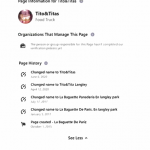
by guest blogger Kieran McCarthy I have a friend who is a professor of literature. He once joined a book club with other professors of literature dedicated to analyzing James Joyce’s notoriously opaque classic, Finnegan’s Wake. They met weekly and…

Las Vegas Skydiving Adventures offers tandem skydiving under the “Fyrosity” brand. It has never offered its services through Groupon. A search for “skydive Fyrosity” at Groupon says “No matching deals. You may also like ….” and produces search results for…

I previously blogged this case last year. I summarized the facts: This case involves a LiveJournal community (the Davis Square community for Somerville, MA). In 2017, LiveJournal changed its policies. In response, Newman, the community moderator, copied all of the…

This is an employer/ex-employee dispute over a Facebook page. As alleged in the complaint, plaintiffs operated a bakery known as “La Baguette,” and hired defendants to manage aspects of the business. Defendants also managed the social media presence of the…

The Supreme Court denied certiorari in Doe v. Facebook, a FOSTA case. The Texas Supreme Court held that FOSTA excluded some claims from Section 230 (disregarding the statutory language Congress adopted), while other claims remain preempted by Section 230. The…

[Today, Betsy Rosenblatt, Rebecca Tushnet and I sent the following letter to Congress on behalf of 26 trademark academics (here’s a PDF version). This complements a separate letter sent by 38 organizations and companies also opposing the SHOP SAFE Act….
By Guest Blogger Tyler Ochoa On February 24, the U.S. Supreme Court held 6-3 that the Ninth Circuit erred in invalidating a copyright registration for failure to comply with the Copyright Office’s “single unit of publication” regulation, where the copyright…

Moonbug runs the CoComelon channel, the top-ranked Kids YouTube channel. Babybus runs a competitive channel that Moonbug believes infringes its copyrights. An example: Moonbug submitted takedown notices to YouTube covering at least 70 videos and sued Babybus for copyright infringement….

Faison runs the Sacramento chapter of Black Lives Matter (BLM). She received several racist and offensive emails from an email address purporting to be Karra Crowley. Faison posted the emails to BLM’s Facebook page and identified Karra as the sender….
By guest blogger Lisa Ramsey, Professor of Law, University of San Diego School of Law Federal Circuit holds refusal to register a political message for T-shirts violates the First Amendment, but fails to acknowledge that these types of registrations can…
